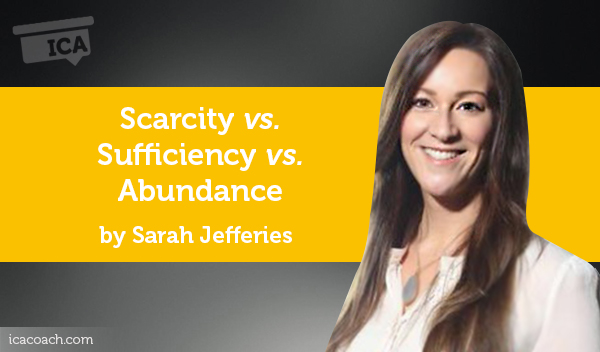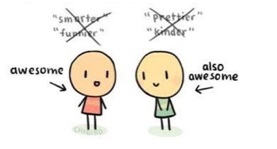
A Coaching Power Tool Created by Sarah Jefferies
(Transformational Coach, UNITED KINGDOM)

Scarcity-based beliefs
Like an oasis in the desert that appears from nowhere, the dawning of one’s own ‘abundance’ within an individual can be game changing. No, in fact, make that life changing. Moving the person almost instantaneously from a place of scarcity, lack, desperation and fear, to a place of hope, fulfillment and gratitude.
Throughout the ages, resources have been finite and therefore evolution has depended on the fittest surviving this innate competition. We’ve been programmed to compete, which instills a sense of win-lose, have-haven’t and can-can’t. Many of our first memories as a child are filled with this dichotomy, presenting itself in the form of scarcity; “Only one can win the egg and spoon race”, “Share your toys”, “Daddy doesn’t have time now”, “You’re not my best friend any more”, “Eat your greens or you can’t have dessert”. As we progress through our teens into early adulthood, these beliefs continue “They don’t love me anymore”, “I’m not smart/rich/beautiful/enough”, “There’s too many of us in line for that promotion”, “I don’t have other skills to change career”. Scarcity manifests itself in the beliefs that “there is not enough”, “I lack” or “I am not enough”.
Lynne Twist, in her book ‘The Soul of Money’ articulates:
Our first waking thought of the day is “I didn’t get enough sleep”. The next one is “I don’t have enough time”…Before we even sit up in bed, before our feet touch the floor, we’re already inadequate, already behind, already losing, already lacking something. And by the time we go to bed at night our minds race with a litany of what we didn’t get, or didn’t get done that day.
Our whole sense of worthiness is therefore questioned when we live according to scarcity-based belief(s).
Clients who hold a scarcity-based belief will likely experience “excruciating vulnerability”, as described by Brene Brown PhD, in her book ‘The Gifts of Imperfection’. If we believe we do not have, or are not enough this leaves us feeling insignificant, helpless, suspicious and potentially jealous of others; competing for time, love, money, food, attention etc. Ultimately, it leaves us vulnerable. The dictionary definition of vulnerability includes “capable of being physically or emotionally wounded…exposed”. Vulnerable clients are therefore also exposed, which is a dis-empowering mind-set from which to operate from, thus meaning that their decisions and behaviours are driven by this sense of “There is not enough”, “I lack” or “I am not enough”, essentially driven from a negative outlook.
These limits seem to be imposed on us by societal norms; rules, expectations, commercialism, peer pressure, media, social networks etc. They create fear. A deep-rooted, intense fear that opportunity, love, friendship, food, time, respect, money and so forth will run out. More often than not we don’t even see or feel this fear creep in, maybe because we’re so used to that feeling of scarcity from such an early age. “It’s normal to feel like this.” Like any other limiting belief, we may therefore fail to observe the unconsciously constraining effect it has on our thoughts, feelings and consequently our behaviours. The unconscious effect that is has on our relationships, our priorities and ultimately our worthiness.
As stated in the paragraph above, these limitations ‘seem’ to be imposed on us. This is distinctly different from they ‘are’ imposed. Legislation is imposed, as is economic policy, freedom rights etc. Our thoughts though? No. We have entire control over these, but if that fear crept in without the conscious realisation, we will likely continue to believe these fears about scarcity and continue to experience excruciating vulnerability. Byron Katie, known for her motivational work on reframing perspective, states “an unquestioned mind is the world of suffering”. Therefore, without questioning the truth of this ‘scarcity’ fear we, and our valued clients, will continue to suffer.
Sufficiency
So how can we move from a place of scarcity to abundance? The interesting part of this power tool is that it develops upon the concept of sufficiency. Twist states “Once we let go of scarcity, we discover the surprising truth about sufficiency…an experience…a knowing that there is enough and that we are enough.” Brown supports that “worthiness doesn’t have prerequisites.” This tool provides a powerful space for a client’s reframing, through the transforming realisation that “I am enough” and “I have enough”. As a coach, this in itself is a value-creating proposition for a client; to find sufficiency and contentment within themselves.
Abundance
This however is a power-tool, not just a make-me-feel-ok-tool! What’s even more powerful than sufficiency, more powerful than “I have enough”, more powerful than “I am enough”? Sufficiency amplified. “I have endless opportunities”, “There are so many possibilities”, “I am completely awesome” and ultimately, “I am equally entitled to and have abundance”. Abundance being an extremely plentiful or overly sufficient quantity/supply and/or overflowing fullness. Energetically, this is where the impetus for change derives. The impetus to optimize and maximize one’s potential. This isn’t about settling for ‘ok’ and ‘comfortable’, this is about re-framing a client to experience the liberating sense of abundance. A place from which opportunity, possibility and optimism derive.
Real-life application
Let’s take Jill for example. A stay-at-home Mum whose children have grown up and left home. Whilst she’s incredibly proud of how independent and successful her children have become, she’s begun to experience a sense of negativity, depression and anxiety over the last year or so since they left. Jill has been out of work for over 15 years, and despite applying for a few Receptionist jobs advertised in the newspaper, she’s had no success. She expressed to her coach “Im just not worthy of a job…there’s no-one out there who’d want to employ me…the only skills I have are raising children”. This is scarcity manifesting as “Im not enough and I don’t have enough”. As a consequence, Jill is left feeling vulnerable. Coaching for ‘sufficiency’ in Jill’s case would be to encourage self-acceptance, for example “I am a good person and would make a worthy employee…I’ve brought up 2 children and so I have valuable transferable skills etc”. This renewed sense of sufficiency in itself adds value to Jill as she gains in confidence and appreciation for herself and her existing abilities. However, this power tool advocates for a sense of abundance within the client. It involves an even deeper inquiry into Jill’s other passions, such as cake decorating, catering for parties, advising on effective parenting skills etc. It requires a deeper inquiry into why she would be the best employee for the jobs she’s applied, to the extent that the companies will want to hire her, so she can present herself in the most optimistic light. It searches for opportunities and a sense-of-self that are beyond accepting ‘what is’ but looking for ‘what could be’ for Jill. This progression from scarcity to sufficiency to abundance are illustrated in the table below.
| Underlying scarcity-based belief | Scarcity | Sufficiency | Abundance |
| “I lack” | “There’s no-one out there who’d want to employ me…the only skills I have are raising children” | “I do have the skills for a Receptionist job, I just need to keep trying.” | “I have a wonderful opportunity to discover and follow my true purpose, and to use my creative skills to do something really meaningful to me” |
| “I am not enough” | “I’m just not worthy of a job…” | “I am worthy enough to get a job” | “I’m incredibly worthy and I will be selective about who I work for and where I give my time/energy” |
Coaching application
This power tool is no different than any other re-framing tool, and therefore the challenge, as the coach, is to listen for and encourage an awareness of this scarcity, as you see it appearing in the client’s life stories, allowing it’s true validity to be questioned.
Identified already in the descriptions above, you may observe scarcity in its most obvious form during your coaching conversation, manifesting from a belief that “I lack” or “I am not enough”. You can begin to challenge the beliefs upon which these statements lie, by asking the following questions:
I lack or I am not enough
Often though, a client may not realise or share their vulnerability. In her 2010 TED Talk, ‘The Power of Vulnerability’, Brown exemplified 4 key behaviours that we exhibit when dealing with vulnerability. As a coach, these may be useful signals to you of scarcity-based underlying beliefs.
-
We Numb
In order to avoid the feelings associated with vulnerability, humans try to numb them through means such as alcohol, eating habits, medicine, drugs, sex, gambling etc. You may witness your clients trying to work around their vulnerabilities by adopting behaviours that disguise or lessen their feelings.
-
We make everything that’s uncertain certain
Clients may try to overcome their vulnerabilities by taking measures to gain greater control through certainty. Certainty providing a fixed structure from which to operate from; a known place that contains less risk. This can lead to generalisations, such as “Everyone is out to hurt me”, “there are no doctors who can help me”, “there’s no other way”, “I’ll never be able to lose all this weight”. It can also lead to blame, which Brown describes as “a way to discharge pain and discomfort”, in the form of “I’m right, you’re wrong”, “It’s their fault, not mine”.
-
We perfect
The process of perfecting is the effort to remove all fault or defect. You may observe your client perfecting themselves, their children, family, job etc. You may also observe the client making comparisons, judgments, feeling insignificant and/or overcompensating in an effort to achieve perfection, under the premise that “if I have/feel perfection, I will have enough, feel enough, be enough”.
-
We pretend that what we do doesn’t have an effect on people
An alternative state to rationalize vulnerability is to ignore it exists. You may observe your client avoiding or ignoring consequences of a situation. Rather facing up to the fact that there is imperfection, or fault, rather than saying “it was me, Im sorry”, your clients may try to deflect blame or ignore consequences of their actions.
According to Brown “we cannot selectively numb emotion …grief, shame, disappointment…you cannot numb those hard feelings without numbing other emotions…joy, gratitude, happiness”. As we see with the 4 behaviors above, there is an unconscious effort to numb, control, remove or ignore our vulnerabilities, which therefore means the positive emotions are also numbed, controlled, removed or ignored. As a result we will see our clients lacking a true sense of contentment, fulfilment and worthiness.
When we are grateful, fear disappears and abundance appears. (Tony Robbins)
To therefore feel a true sense of abundance, the client must be able to feel and appreciate joy, happiness & gratitude and it is therefore incredibly valuable to bring awareness in your client to these behaviours above, and question their validity in order for them to recognize them in their daily lives and begin to reframe perspective. Questions such as “how Is that behavior serving you”, “what is the impact of that”, “what is the reason you need that behavior” may be good places to start.
Some additional suggested exercises for arousing awareness and practicing gratitude are listed below. These need to be incorporated in a way that is not deemed as advice/control, but more so part of an inquiry with the client’s permission, and only after the client has, themselves, explored all possible solutions they can think of.
| Today I avoided my feelings/emotion by…(numbing) | Today I controlled my feelings/emotion by… (making something certain) | Today I removed my feelings/emotion by… (perfecting) | Today I ignored my feelings/emotion by… (pretending) |
Reflection questions
- In what areas of your life do you experience a feeling of lack, i.e. “I do not have enough X”?
- In what areas of your life do you experience a feeling of unworthiness, i.e. “I am not enough/I am not worthy”?
- When you experience this sense of scarcity, how does it make you feel? What emotions does it trigger?
- What impact has this feeling of scarcity had on your behaviours/actions?
- How does that thought serve you?
- Without this feeling of scarcity, what would/could you achieve/accomplish?
References, and further reading:
Brene Brown (2010) The Gifts of Imperfection
Brene Brown (2010) TED Talk: The Power of Vulnerability http://www.ted.com/talks/brene_brown_on_vulnerability.html
Brene Brown (2012) Daring Greatly
Byron Katie (2002) Loving What Is: Four questions that can change your life
Lynne Twist (2003) The Soul of Money
10 steps to manifest abundance http://www.mindbodygreen.com/0-12603/10-steps-to-manifest-abundance.html
Amy Shah, The one mindset shift that will improve your life forever http://amyshahmd.com/2014/02/26/whats-the-one-mindset-shift-that-will-improve-your-life-forever/
Why abundance means more than making lots of money